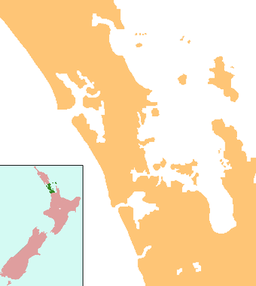Coxs Bay
| Opoututeka / Coxs Bay | |
|---|---|
 Opoututeka (Coxs Bay), Auckland, NZ | |
| Location | Waitematā Harbour |
| Coordinates | 36°51′00″S 174°43′30″E / 36.849917°S 174.725041°E |
| River sources | Coxs Creek |
| Basin countries | New Zealand |
| Max. length | 1 km (0.62 mi) |
| Max. width | 1 km (0.62 mi) |
| Surface area | 1 km2 (0.39 sq mi) |
| Average depth | .2 metres (0.66 ft) |
Coxs Bay or Opoututeka is a bay located in the Waitematā Harbour in the Auckland region of New Zealand. It lies between the settlements of Westmere and Herne Bay to the southwest and northeast respectively, and to the southeast is Grey Lynn. The Bay is protected from the west by the end of one of the longest lava flows in the Auckland volcanic field, Te Tokoroa / Meola Reef.[1][2]
History[edit]
The bay, creek and surrounding land, with its extensive wetlands, food and flax, were of significance to multiple iwi.[3] Flax grown in the Coxs Bay gully was harvested, processed and then dried on the north-facing hills in Herne Bay.[3]
The first purchase of land by Europeans in the area around Coxs Bay was in 1840.[4] The western boundary of this land was Opou or Coxs Creek. In the early 1840s, John and Jane Cox set up a market garden in the area, and this is where the European name for the Creek and Bay came from.[3][4][5]
In 1859, what was then known as Richmond, located between Edgars and Coxs Creek was divided into lots.[6] The streets now known as Regina, Kingsley, Livingstone, Webber, and Edgars (formerly Queen, King, Stanley, Webber, and Victoria) were then laid out, and logs for the early houses were floated up Coxs Creek and pit sawn on site.[6][7]


Industrial development in the area started with a brick factory in 1860 with products being shipped via Coxs Creek to Auckland. In 1899, Cashmore Brothers set up a steam-powered sawmill beside the creek below Coxs Bridge Rd (later renamed West End Rd).[8] The bay and creek were used for the transport of logs and timber. Despite strong protest by the growing local population, this mill operated until 1920 when it accidentally burnt down leaving sawdust and timber smouldering for over a year.[8][9]
The bridge over Coxs Creek that links Westmere and Herne Bay is first recorded being built in 1881, and then subsequently demolished in 1885 and rebuilt in 1886.[10][11][12] The lower level of the Hawke Scout Hall was built in the late 1920s and is still an important part of the local community and a significant building in the area.
In 1938, a landslide deposited several tons of earth upon the road and Coxs Creek bridge.[13] In January 2023, there were several landslides and a fallen tree due to extensive flooding that also closed West End Road.[14]
Present Day[edit]
Across West End Road from the Bay is Coxs Bay Reserve, a large park with sports fields for rugby and cricket.[15] It is approximately 14 hectares, and there are several walking trails through the park.[15]
Coxs Bay itself is considered unsuitable for swimming, collecting shellfish, and fishing due to poor water quality, and this is a special status due to either "a history of poor or highly variable water quality".[16] It is a permanent no-swim notice, due to frequent wastewater spills.[17] In 2007, Auckland City Council dredged the Creek to restore tidal flow and in 2013, Watercare Services Limited announced a $1 billion dollar project to intercept major overflows, that would make the Bay and Creek swimmable again.[18] This project is scheduled to be completed in 2030.[18]
References[edit]
- ^ McClure, Margaret (6 December 2007). "Meola reef". 'Auckland places - Waitematā Harbour', Te Ara - the Encyclopedia of New Zealand. Archived from the original on 12 August 2022.
- ^ McClure, Margaret (6 December 2007). "Waitematā Harbour". 'Auckland places - Waitematā Harbour', Te Ara - the Encyclopedia of New Zealand. Archived from the original on 26 October 2022.
- ^ a b c "Get to know Westmere". Ray White Ponsonby. 14 October 2022. Retrieved 15 June 2023.
- ^ a b Sturm, Sean (14 March 2010). "Meanderings about Cox's Creek". TE IPU PAKORE: THE BROKEN VESSEL. Archived from the original on 22 September 2016.
- ^ Hiyama, Kaaren (1991). High hopes in hard times : a history of Grey Lynn and Westmere. Grey Lynn, N.Z.: Media Studies Trust. p. 10. ISBN 0-473-01467-X. OCLC 154684723.
- ^ a b Hiyama, Kaaren (1991). High hopes in hard times : a history of Grey Lynn and Westmere. Grey Lynn, N.Z.: Media Studies Trust. p. 11. ISBN 0-473-01467-X. OCLC 154684723.
- ^ "Advertisements Column 2". New Zealand Herald. Vol. LIV, no. 16473. 24 February 1917. p. 10.
- ^ a b Hiyama, Kaaren (1991). High hopes in hard times : a history of Grey Lynn and Westmere. Media Studies Trust. Grey Lynn, N.Z.: Media Studies Trust. pp. 45–46. OCLC 154684723.
- ^ "TIMBER MILL BURNED". New Zealand Herald. Vol. LVII, no. 17361. 7 January 1920. p. 6.
- ^ "Untitled". New Zealand Herald. Vol. XIX, no. 6417. 12 June 1882. p. 4.
- ^ "SCINTILLATIONS". Auckland Star. Vol. XII, no. 3394. 16 June 1881. p. 2.
- ^ "City Council". New Zealand Herald. Vol. XXII, no. 7281. 20 March 1885. p. 6.
- ^ "NORTHERN ROADS". New Zealand Herald. Vol. LXXV, no. 23100. 27 July 1938. p. 14.
- ^ "'It was pretty crazy': Tree collapses on Herne Bay Rd". NZ Herald. 16 June 2023. Retrieved 15 June 2023.
- ^ a b Council, Auckland. "Coxs Bay Reserve". Auckland Council. Retrieved 15 June 2023.
- ^ "Cox's Bay". Land, Air, Water Aotearoa (LAWA). Retrieved 15 June 2023.
- ^ "The invisible contamination at New Zealand's beaches". Newshub. Retrieved 15 June 2023.
- ^ a b Owen, Catrin (16 November 2016). "Auckland bay's swimming in sewage and tampons". Stuff. Retrieved 15 June 2023.

